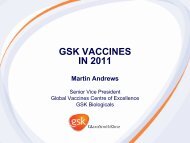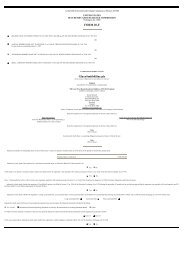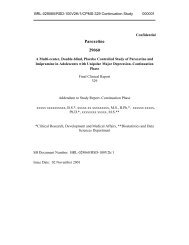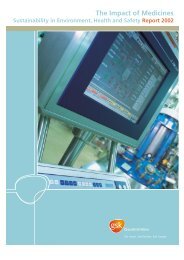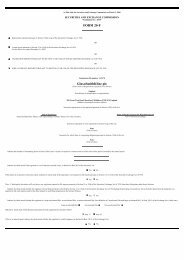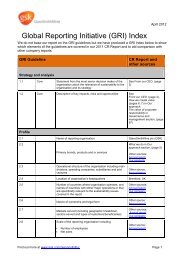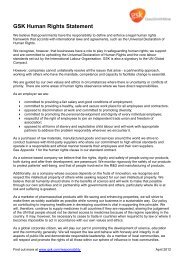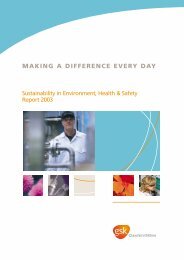GSK Annual Report 2002
GSK Annual Report 2002
GSK Annual Report 2002
You also want an ePaper? Increase the reach of your titles
YUMPU automatically turns print PDFs into web optimized ePapers that Google loves.
Operating resources<br />
Intellectual property<br />
GlaxoSmithKline regards its intellectual property as a key business<br />
asset. The effective legal protection of intellectual property is<br />
critical in ensuring an effective return on investment in R&D.<br />
Intellectual property can be protected by patents, trade marks,<br />
registered designs, copyrights and domain name registrations.<br />
Patent and trade mark rights are regarded as particularly valuable.<br />
Patents<br />
GlaxoSmithKline’s policy is to obtain patent protection on all<br />
significant products discovered or developed through its R&D<br />
activities. Patent protection for new active ingredients is available in<br />
all significant markets. Protection can also be obtained for new<br />
pharmaceutical formulations and manufacturing processes and for<br />
new medical uses and special devices for administering products.<br />
The patent position with respect to significant products is as<br />
follows:<br />
Augmentin. In the USA patents on the key active ingredient,<br />
potassium clavulanate, extending to 2018, were held invalid by<br />
decisions of a federal court in 2001 and <strong>2002</strong>. These decisions are<br />
under appeal. In other markets, the patents on potassium<br />
clavulanate have expired, except in Italy (2006 c ).<br />
Avandia and Avandamet. The basic patent on the active ingredient<br />
rosiglitazone in these products is not due to expire until 2011 a in<br />
the USA and 2013 in Europe. Patents on the commercial form of<br />
the active ingredient rosiglitazone maleate are not due to expire<br />
until 2015 in the USA and 2014 b in Europe.<br />
Avodart. Patents on the active ingredient dutasteride have a<br />
normal expiry of 2013 (USA) and 2014 (Europe). Requests for<br />
extension of term of these patents are pending and are expected<br />
to extend the terms of these patents to 2015 a in the USA and<br />
2017 b in Europe.<br />
Combivir. The patents on the specific combination of lamivudine<br />
and zidovudine are not due to expire until 2012 in the USA and<br />
2013 b in Europe.<br />
Coreg. GlaxoSmithKline is exclusive licensee under the US patent<br />
on the active ingredient carvedilol, which is not due to expire until<br />
2007 a .<br />
Epivir. The patents on the active ingredient lamivudine are not due<br />
to expire until 2009 a in the USA and 2011 b in Europe.<br />
Flixotide/Flovent and Flixonase/Flonase. In the USA, the patent on<br />
the active ingredient fluticasone propionate expires in 2003, but<br />
protection is expected to be extended by virtue of paediatric<br />
exclusivity until May 2004. In most European countries protection<br />
is not due to expire until 2005.<br />
Imigran/Imitrex. The patents on the active ingredient sumatriptan<br />
are not due to expire until 2008 in the USA and 2006 b in Europe,<br />
(2010 c Italy).<br />
Lamictal. The patents on the active ingredient lamotrigine are not<br />
due to expire until 2008 a in the USA (2009 by virtue of paediatric<br />
exclusivity) and 2005 b in Europe. GlaxoSmithKline has initiated<br />
legal action in the USA against a generic manufacturer that is<br />
attempting to launch its own version of the product prior to this<br />
patent expiry.<br />
Levitra d . GlaxoSmithKline has co-promotion rights under the US<br />
patent on the active ingredient vardenafil which is not due to<br />
expire until 2018 in the USA.<br />
Description of business GlaxoSmithKline 23<br />
Paxil/Seroxat. The patent protecting the commercial form of<br />
Paxil/Seroxat is not due to expire, in most major markets, until<br />
2006. GlaxoSmithKline has initiated patent infringement litigation<br />
in the USA, Europe and several other markets against a number of<br />
generic manufacturers who are attempting to launch their own<br />
versions of the product prior to this patent expiry.<br />
Retrovir. There are no patents on the active ingredient zidovudine.<br />
Patents covering pharmaceutical formulations containing<br />
zidovudine and their medical use are not due to expire until 2005<br />
in the USA and 2006 in Europe.<br />
Seretide/Advair. The patents on the specific combination of active<br />
ingredients salmeterol and fluticasone propionate are not due to<br />
expire until 2010 in the USA and 2013 b in Europe. A patent<br />
challenge has been made to the combination patent in the UK.<br />
Serevent. Patents on the active ingredient salmeterol xinafoate are<br />
not due to expire until 2005 b in most of Europe (2008 b in France<br />
and 2009 c in Italy) and until 2008 in the USA.<br />
Valtrex. The patents on the active ingredient valaciclovir are not<br />
due to expire until 2009 a in the USA and 2009 b in Europe.<br />
Wellbutrin SR and Zyban. Patents on the basic active ingredient<br />
have expired. Various formulation patents protect the currently<br />
marketed SR (sustained release) formulations, the latest of which<br />
is not due to expire in the USA until 2013. These patents are under<br />
legal challenge in the US courts. In Europe, regulatory data<br />
exclusivity provides protection until at least 2005, and until 2009<br />
in some countries.<br />
Ziagen. The patents on the active ingredient abacavir are not due<br />
to expire until 2011 a in the USA and 2014 b in Europe.<br />
Zofran. The patents on the active ingredient ondansetron are<br />
not due to expire until 2005 in the USA and 2005 b in Europe,<br />
(2010 c Italy). Patents on use in treating emesis expire in 2006.<br />
GlaxoSmithKline has initiated legal action under these patents<br />
against generic manufacturers in the USA.<br />
Trade marks<br />
All of GlaxoSmithKline’s pharmaceutical products are protected by<br />
registered trade marks in major markets. In general, the same mark<br />
is used for a product in each market around the world, but there<br />
may be local variations. For example in the USA the trade mark<br />
Paxil is used instead of Seroxat and Advair is used instead of<br />
Seretide.<br />
Trade mark protection may generally be extended for as a long as<br />
the trade mark is used by renewing it when necessary.<br />
GlaxoSmithKline’s trade marks on pharmaceutical products<br />
generally assume an increasing importance when the patent for<br />
that product has expired in a particular country and generic<br />
versions of the product become available.<br />
In the Consumer Healthcare business trade marks are particularly<br />
important, as the business is very brand orientated and many<br />
products do not have patent protection.<br />
GlaxoSmithKline is routinely engaged in legal disputes in defence<br />
of intellectual property rights on many of its products (see Note 30<br />
to the Financial statements, ‘Legal Proceedings’).<br />
a Including extension of term<br />
b Including extension of term by supplementary protection certificates<br />
c Including extension of term by national supplementary protection certificate, as<br />
notified following a recent change in Italian law but subject to legal challenges<br />
d a Registered Trademark of Bayer AG.



